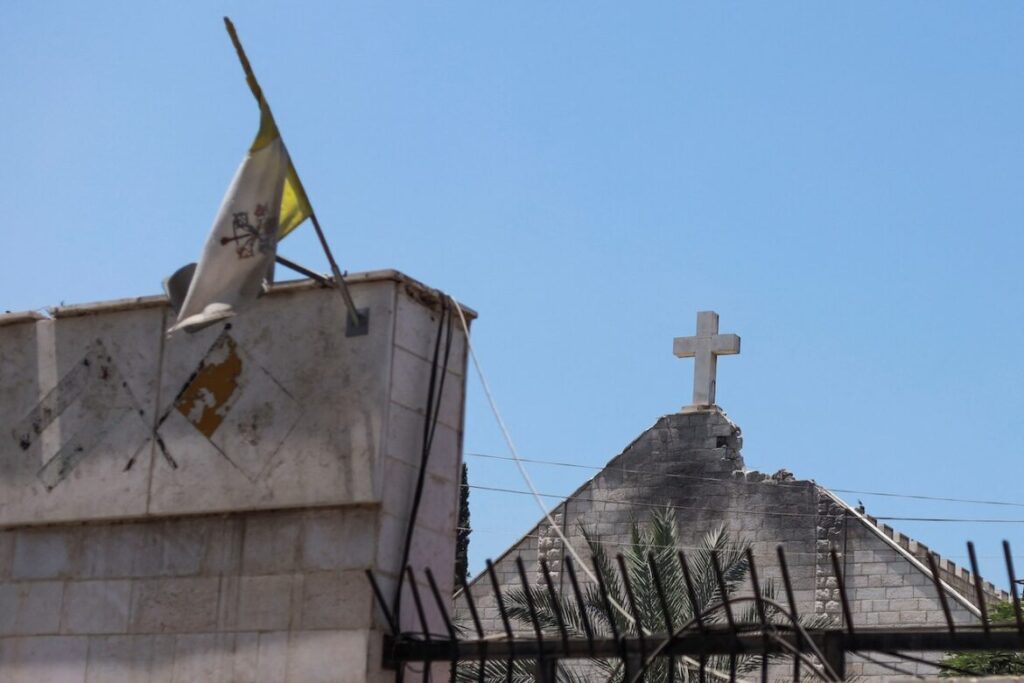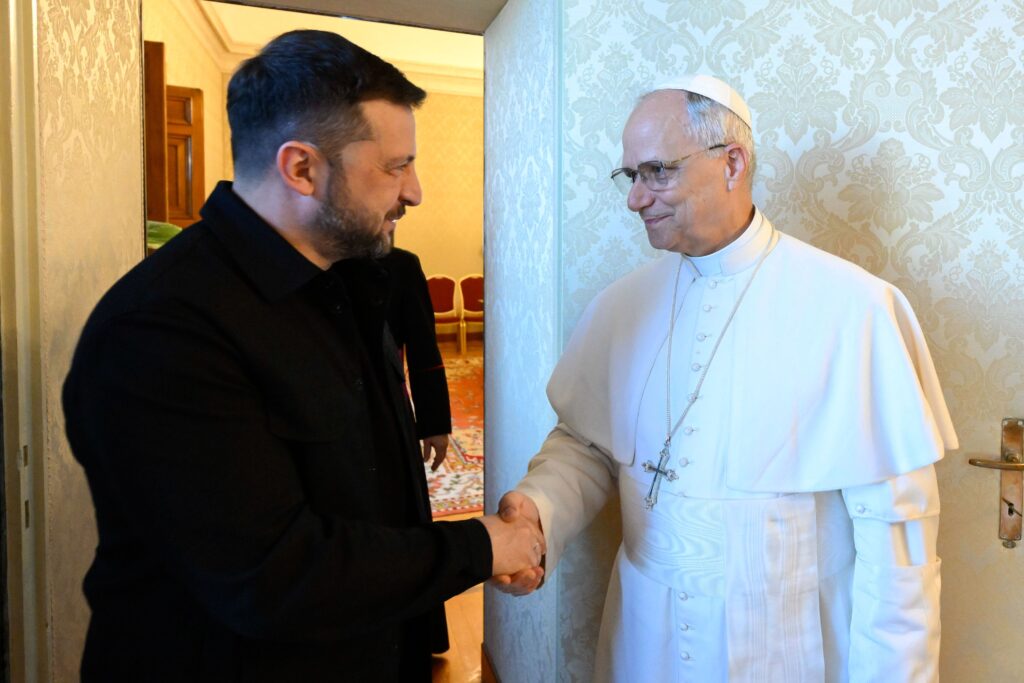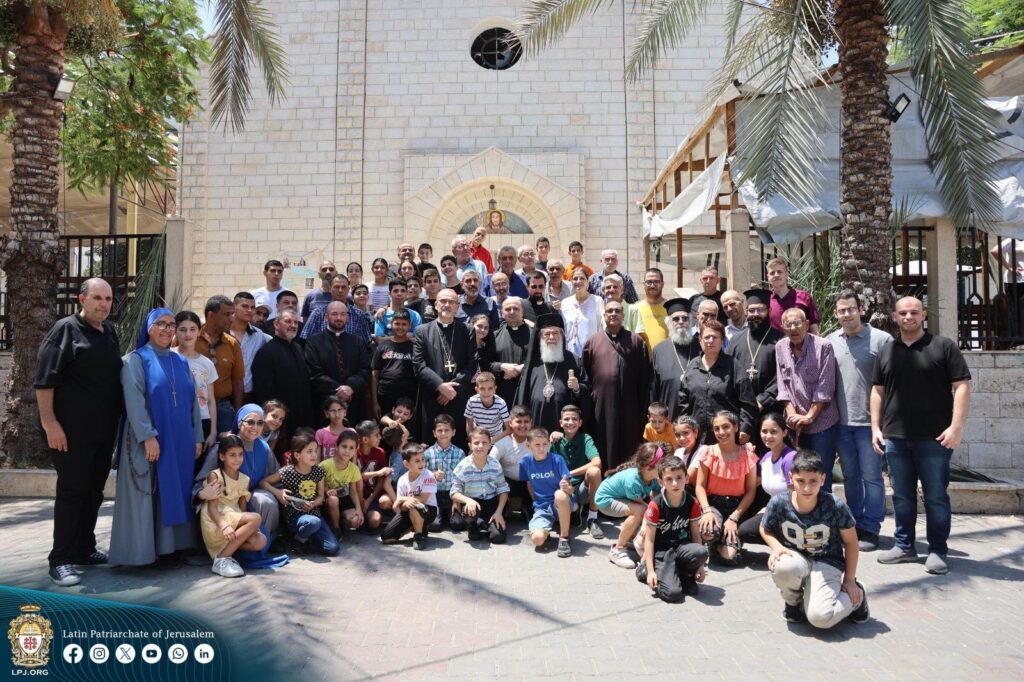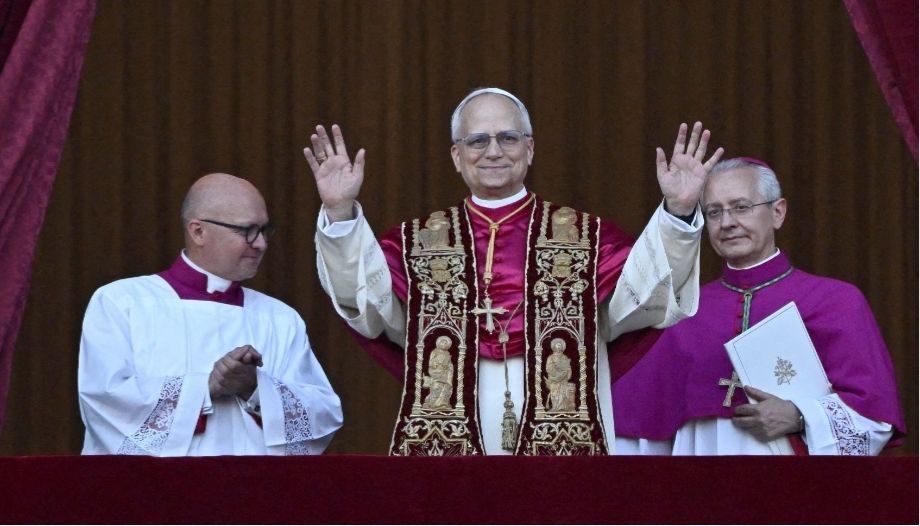The new Pope Leo XIVOn May 8, visibly moved, he addressed the faithful in St. Peter's Square and the expectant world and said: "Peace be with you all. Peace, an immediate cease-fire, negotiations, and even a cease-fire, he said. the end of the waris precisely what the Pope has asked fortwo and a half months later, to the Prime Minister of Israel, Benjamin Netanyahu.
The trigger has been the attack on the catholic parish of the Holy Family in Gaza by an Israeli tank. Meanwhile, with his mind on the war in Ukraine, Leo XIV has been in dialogue with Zelenski, with Putin, and asks for prayers and involves everyone.

First peace greeting, May 8th
On May 8, from the Central Lodge of St. Peter's, the newly elected Pope He said: "Dear brothers and sisters, this is the first greeting of the Risen Christ, the Good Shepherd, who gave his life for God's flock. I would also like this greeting of peace to enter your hearts, to reach your families, to all people, wherever they are, to all peoples, to the whole earth. Peace be with you!".
"A disarmed and disarming peace."
Then the new Pope, "son of St. Augustine," gave some adjective: "A disarmed and disarming peace," he said. "This is the peace of the risen Christ, a disarmed peace and a disarming peace, humble and persevering. It comes from God, God who loves us all unconditionally."
Commenting on these words, and those pronounced by the new Pope in his homily at the Eucharist at the beginning of his Petrine ministry on May 18, Archbishop Luis Marín de San Martín, an Augustinian, highlighted in Omnes some of the main lines that can be nuclear, and are already beginning to be so, in the Pontificate of Leo XIV.
"Serene shepherd for a troubled world".
"The first is the centrality of the Risen Christ: 'We want to say to the world, with humility and joy, look to Christ, draw close to him, accept his Word that enlightens and consoles! Listen to his proposal of love to form his one family: in the one Christ we are one". This leads him to take special care of unity, indeed, communion in the Church, which is his first great desire. A united Church, a sign of unity and communion, which becomes a leaven for a reconciled world. This will only be possible if we take love as the axis of our life. He also indicated this in his first greeting (...)".
Shortly thereafter, in a text entitled significant title The Augustinian Archbishop went on to comment on the first words of the new Pope from the central balcony, the balcony of great occasions: "We want to be a synodal Church, a Church that walks, a Church that always seeks peace".
Address to the diplomatic corps
Archbishop Luis Marin, who has known "Robert Prevost for many years, with whom I share an Augustinian vocation and charism", notes "the commitment to peace" of the new Successor of Peter, "which has been a constant in the Pope's texts". "For example, the demanding and clear speech of May 16 to the diplomatic corps, which I invite you to read in its entirety".
The canonist and writer Rafael Sanz Carrera has highlighted, in a text with another significant title -'Leo XIV, a bridge to peace'-, his opening greeting. "In his first public appearance, the new Pope Leo XIV needed no grand gestures to make clear the direction of his pontificate. One word was enough: peace. That was the first one he uttered in addressing the world, a deliberate choice that did not go unnoticed."
"Shepherd of bridges" with open arms
In his analysis, Rafael Sanz believes that in this way Leo XIV wanted "to emphasize from the outset that his mission would be that of a shepherd of bridges. His vision is that of a united Church that goes out into the world to heal wounds, serve the most needy and build common paths based on faith and reason".
In his opinion, "one of the most significant moments of his first speech was the image of St. Peter's Square with open arms: this is how Leo XIV understands the role of the Church in today's world. A Church that resembles that square, where everyone can fit, and that knows how to receive with tenderness those who arrive wounded, confused or excluded (...). the new Pope proposed a missionary, dialoguing, profoundly human community, where Christian love is not only an ideal, but a real experience".
Ask everyone to help in the dialogue, as Francis did
In his opening address, Pope Leo XIV, referred to his predecessor, Pope Francis. "We still preserve in our ears the faint but always courageous voice of Pope Francis blessing Rome. The Pope, while blessing Rome gave his blessing to the world, to the whole world, that Easter morning."
"Let me continue that same blessing: God loves us, God loves you all, and evil will not prevail. We are all in God's hands. Therefore, without fear, united, holding hands with God and with each other let us go forward."
"We are disciples of Christ. Christ precedes us. The world needs his light. Humanity needs him as a bridge to be reached by God and by his love," he continued. "Help us also you, then help each other to build bridges, with dialogue, with encounter, uniting us all to be one people always in peace. Thanks to Pope Francis!" he concluded this part of his opening remarks.
Constant hammering for peace
Since then, Pope Leo's messages for peace have been constant, and his efforts are intensifying. The most recent ones have concerned the attack on the Catholic parish in the Gaza Strip, as we have recalled.
Facts and words of the work for peace of Leo XIV
Here is a part of Pope Leo XIV's work for peace, the public part, the part that has transcended the most:
- 8 May. Speech after being elected Popefrom the central loggia of St. Peter's Basilica. Greetings of peace to all the Earth. "Peace be with you all. (discussed above).
"Never again war!"
- May 11. First Regina coeli from Central Loggia of St. Peter's Basilica: "Never again war!"
The Pope remembers the anniversary of the Second World War. It ended 80 years ago, on May 8, after having caused 60 million victims. And he says:
"As Pope Francis has affirmed on more than one occasion, I too address the great ones of the world, repeating the ever timely appeal: 'Never again war!'
The Pope referred to the "beloved Ukrainian people," the prisoners, and "that the children may return to their families."
Humanitarian aid
"I am deeply saddened by what is happening in the Gaza Strip - cease fire immediately! Humanitarian aid be provided to the exhausted civilian population and all hostages be released."
"I have welcomed the announcement of the ceasefire between India and Pakistan, and wish that through the upcoming negotiations a lasting agreement can be reached soon."
-May 12. Meeting with communicators.
He recalls the imprisoned journalists, calls for their release, and urges unarmed and disarming communication.
- May 12. Conversation with the President of Ukraine.
Volodimir Zelenski makes public on the X network that he has invited the Pope to Ukraine: "Such a visit", the message said, "would bring true hope to all believers and to all our people".

- May 16. Hearing with the Diplomatic Corps.
He encourages ambassadors to work together to build a world of truth, justice and peace.
- May 18. Audience with the President of Ukraine, Volodimir Zelenski, after the Mass for the inauguration of the Pontificate.
After the meeting, Zelenski wrote in X that he had thanked the Pope for his words on Ukraine at the Regina Coeli the previous Sunday. In particular, "on the need for a just peace". The Pope also greeted presidents and heads of state from different countries.
- May 21. General Audience
Appeal for Gaza and promotion of peace based on dialogue.
A Church that builds bridges, that engages in dialogue
- May 24. Address to the Curia.
"Missionary Church, Church that builds bridges, dialogues, always open to welcome with open arms all, all those who need our charity, our presence, our dialogue and our love".
Conversation with President Putin
- 4 June. Conversation with Russian President Vladimir Putin on the phone
Pope Leo XIV and Russian leader Vladimir Putin held a first telephone conversation on June 4. The leader of the Catholic Church encouraged the Russian president to make a gesture of peace with Ukraine, the Vatican press office reported.
- June 22nd. Angelus. May weapons not stifle the cry of humanity.
The Pope launches a urgent appeal the international community to put an end to the conflicts in the Middle East, with special concern for the situation in Iran, Israel and Palestine. In his message, he warned about the suffering of the civilian population, particularly in Gaza and other affected territories.
Condemnation of the attack in Damascus
- 25 June. Condemnation of the attack on an Orthodox church in Damascus (Syria).
Leo XIV urges the international community not to abandon Syria, and calls for dialogue, diplomacy and peace for the entire Middle East. Pope Leo addresses all Christians in the Middle East saying, "I am close to you, the whole Church is close to you." "We follow closely and with hope the events in Iran, Israel and Palestine", he said.
Again with Zelenski
- July 9. Second visit of the President of Ukraine to Leo XIV.
The Pope received in audience Zelenski on July 9, and reaffirmed his readiness to host Russian and Ukrainian representatives for negotiations at the Vatican.
- July 9. The care of the common home
"It seems that there is still no awareness that destroying nature does not harm everyone in the same way: trampling on justice and peace means affecting above all the poorest, the marginalized, the excluded. In this context, the suffering of indigenous communities is emblematic". This is the denunciation made by Pope Leo XIV in his message for World Day of Prayer for the Care of Creationwhich will be held on September 1, 2025.
- July 13. First Angelus of Leo XIV at the residence of Castel Gandolfo.
"Let us not forget to pray for peace and for all those who, because of violence and war, find themselves in a situation of suffering and need."
- 16 July. Promoting peaceful societies in the service of human development.
Message of Leo XIV, signed by Secretary of State Parolin, on the occasion of the XX National Congress of the Italian Confederation of Workers' Trade Unions (CISL) inaugurated in Rome. The common objective is "a more humane order of social relations" in order to contribute to the "tranquility of order" so dear to St. Augustine. With that expression, St. Augustine refers to peace as a state of harmony and equilibrium that arises when each thing and each person occupies its proper place in a just order.
The heart's match
- 16 July. Sport transforms conflict into encounter
In a video message for the Partita del Cuore (The Party of the Heart), which took place in L'Aquila, the Pope recalled that "the greatest challenge is to unite us," especially in these times of "divisions, bombs and wars." Playing together, the Pope stressed, is ultimately about coming together.
Leo XIV recalls in the video the Truce of 1914 in World War I, which took place at Christmas.
- 17 July. Pope Leo XIV calls for an immediate cease-fire in Gaza.
Following the aforementioned Israeli attack on the Catholic parish in Gaza, the Pontiff "renews his call for an immediate cease-fire, and expresses his deep hope for dialogue, reconciliation and lasting peace in the region."
To Netanyahu, "the end of the war".
- July 18 Pope Leo XIV calls on Israeli Prime Minister Netanyahu to cease hostilities and end the war.
Cardinal Pietro Parolin, Secretary of State of the Holy See, in an interview with Tg2 Post (RAI), described Prime Minister Netanyahu's call to the Pope as "timely" and "positive," Vatican News reported. "It was not possible not to explain to the Pope, not to inform the Pope directly of what happened, which is of absolute gravity," Cardinal Parolin said.
The Vatican Secretary of State called for clarity on the assault on the Holy Family Church in Gaza, describing the conflict as "a war without limits".
Other reactions: Cardinals Parolin, Chomalí...
In addition to the Cardinal ParolinCardinal Fernando Chomalí, Archbishop of Santiago de Chile, who has described the situation in Gaza as "unsustainable", has been one of the ecclesiastics who has been most vocal in his assessment.
"I express my solidarity and my total and clear rejection of such an act that left two dead (there were finally three, and several wounded, some seriously), the wounded parish priest, Fr. Gabriel Romanelli, and a Church, which hosted hundreds of Gazans displaced by the war," he said in a press release on July 17.
"When an attack is made against the house of God, it is an attack against the most sacred thing that a human being has, his faith, source of hope and charity," the Cardinal added. In his opinion, "this inhuman act" must be condemned transversally by all people of good will and "must deeply challenge those who still believe that with violence they will achieve their political objectives".

Pope's closeness to Patriarch Pizzaballa
Following the attack on the Gaza parish, Pope Leo XIV contacted the Latin Patriarch of Jerusalem, Cardinal Pierbatista Pizzaballa, who was attending the parish of the Holy Family, the Vatican agency reported, accompanied by Greek Orthodox Patriarch Theophilos III.
Leo XIV expressed his "closeness, concern, prayer, support and desire to do everything possible not only to achieve a cease-fire, but also to put an end to this tragedy".
"The Pope repeated several times that it is time to stop this massacre, that what happened has no justification whatsoever, and that we must ensure that there are no more victims," Patriarch Pizzaballa said on statements to Vatican News.
On behalf of the Latin Patriarchate and all the Churches of the Holy Land, Pizzaballa thanked the Pope "for his solidarity and the prayers he had already assured us of", expressing also the gratitude of the entire Catholic community of Gaza.
Moreover, amid growing international concern, leaders from around the world have condemned the July 17 attack on the Holy Family parish in Gaza City.







